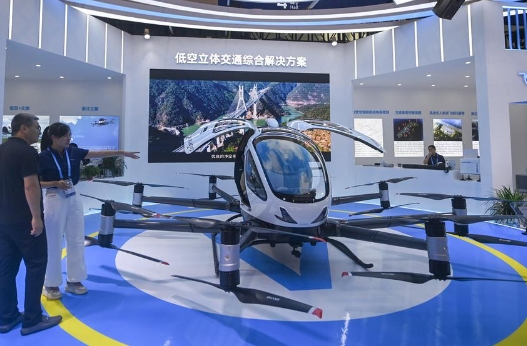New tech at digital trade expo signals China's foreign trade momentum

Robots perform dance at a booth during the third Global Digital Trade Expo in Hangzhou, east China's Zhejiang Province, Sept. 25, 2024. (Xinhua/Xu Yu)
The third Global Digital Trade Expo, currently unfolding in Hangzhou, capital of east China's Zhejiang Province, is offering a glimpse into avant-garde technologies that are unlocking the country's burgeoning potential in foreign trade.
Over the span of five days, the exhibition is featuring 446 new products and technologies, ranging from robots performing remarkable tasks like opening bottles and sorting waste to AI-driven digital humans engaging in debate competitions.
"I was impressed most by medical AI displayed at the exhibition, such as robotic surgical arms and screening clinics," said Kgaladi Melia Thema, a consultant for innovation and technology of Small Enterprise Development Agency, South Africa.
"Nurses can use chronic disease management screening products for patients, which can be applied both at home and in clinics. This reduces costs and enables remote patient monitoring, offering great potential," she added.
Digital technologies such as big data, cloud computing and blockchain are taking center stage at the expo, underscoring how China is harnessing these innovations to propel its foreign trade.
At the booth of iFLYTEK Co., Ltd., a front-runner in China's AI and speech technology industry, several African visitors were immersed in real-time conversations with staff through a state-of-the-art multilingual AI-powered translation screen. Despite the bustling environment, the screen, equipped with advanced voice recognition technologies, accurately captured and responded to human voices.
"Overseas business is poised to become a significant growth engine for us in the coming years. Our aspiration is for it to constitute one-third of our business segments in the future," said Liu Qingfeng, chairman of iFLYTEK.
Chinese cultural exports are also stealing the show at the exhibition. In the digital entertainment zone, innovative exhibits such as an AI-powered representation of Su Dongpo, a celebrated poet from the Song Dynasty (960-1279), a virtual museum of traditional Chinese music, as well as a 3D display of the four bronze animal heads from the Old Summer Palace (Yuanmingyuan), are offering visitors a fascinating glimpse into the richness of Chinese culture.
"The fusion of digital technology with the splendor of traditional Chinese culture has not only expanded our export opportunities, but also invigorated the growth of China's culture industry," said Wu Shuang, a staff member of Zhejiang Kayou Animation Co., Ltd., a domestic card game creator.
Visitors are also being treated to futuristic transportation solutions, including autonomous boat taxis and the electric Vertical Take-off and Landing (eVTOL) vehicles, all being showcased for the first time at this year's expo.

A visitor learns about a driverless aircraft at the Smart Mobility Zone during the third Global Digital Trade Expo in Hangzhou, east China's Zhejiang Province, Sept. 25, 2024. (Xinhua/Huang Zongzhi)
"China is rightly regarded as a global leader in digital technologies and innovations," said Zhaslan Madiyev, minister of Digital Development, Innovations and Aerospace Industry of the Republic of Kazakhstan, adding that China's advancement in digital trade is not only creating new avenues for cooperation, but also enhancing global trade infrastructure, fostering sustainable development worldwide.
"Chinese technologies and innovations are enhancing supply chains, making them faster and more efficient, while also improving access to goods and services," Madiyev noted.
According to the Global Digital Trade Development Report 2024 released during the event, global digital trade soared to around 7.13 trillion U.S. dollars (about 1.02 trillion yuan) in 2023, up from 6.02 trillion U.S. dollars in 2021, marking an average annual growth rate of 8.8 percent.
The report also highlighted that the import and export scale of China's cross-border e-commerce reached 2.37 trillion yuan last year, up 15.3 percent year on year.
Mercado Libre, a leading Latin American e-commerce platform, witnessed a 70-percent increase in online Chinese sellers and a 75-percent surge in their sales on its platform in 2023.
The company has opened its cross-border e-commerce services to Chinese sellers in Mexico, Brazil, Chile and Colombia, according to its representative at the expo, who also emphasized the escalating significance of the Chinese market.
As China's sole national-level event focusing on the theme of digital trade, the expo has drawn over 1,500 enterprises, including more than 300 international companies, and over 30,000 purchasers this year.
Editor:伏娅敏
